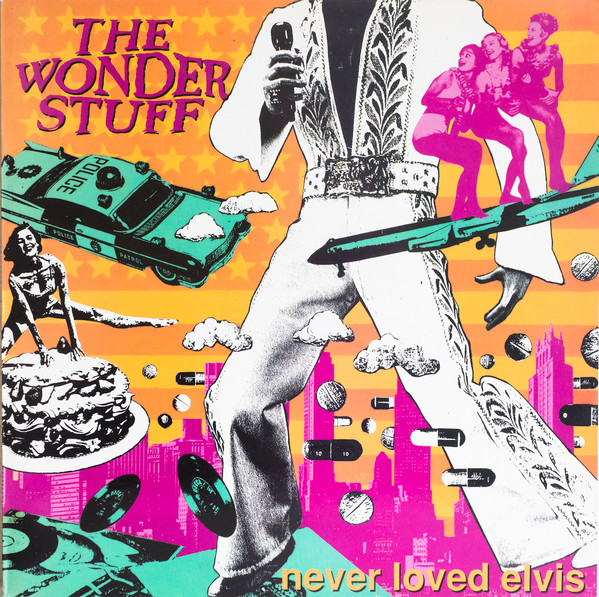Few acts split opinion like The Wonder Stuff over the years, on one hand their detractors are plentiful and vocal, yet their fans have been loyal and passionate. Rising to prominence in the late 80s when being a guitar band usually meant you were heavy metal, arena rock, The Pixies or The Smiths, they offered a viable alternative, singalong choruses and a confrontational attitude if you didn’t like them.
Initially a quartet consisting of drummer Martin Gilks, ‘Bass Thing’ Rob Jones, vocalist Miles Hunt and guitarist Malc Treece, their sound was initially grounded in a poppy post-punk thrash that evolved over the years to the point where listening back to their early albums now, you can hear the very evolution of what would later be called Britpop, though we can hardly blame them for the subsequent crimes committed by acts under that sorry banner.
Debut album, The Eight Legged Groove Machine, was a fully realised modern classic, consisting of short sharp and bouncy tunes, resplendent with sneered cynical lyrics and a distinct commercial edge. Listening to it all these years later, there’s still little that could have been added or removed from it that would have improved it. As a guitar band that had grown up through the 80s, it was a suitably angry, enthusiastic and energetic album by a group of young men with points to prove and things to say. The singles from it were equally as ear-catching and strident and very much the type of thing that the weekly music press were getting behind at the time.
If The Eight Legged Groove Machine was a triumph, then follow up Hup was the Wonder Stuff’s flawed masterpiece. The album built on the strength of its predecessor, but also expanded the sound and scope of the band, largely on the back of recruiting multi-instrumentalist Martin Bell as a guest musician. The choruses were bigger, the scores to be settled were more bitter and the album more diverse – on the whole, it should have been perfect, however odd decisions were made on the running order of the tracks that ensured that Hup was slightly less than the sum of its parts. “Good Night Though” was one of The Stuffies’ best album cuts and one of the greatest closing tracks of all time recorded by anyone anywhere anytime. Quite why it was unceremoniously plonked three quarters of the way through Hup’s runtime is something of a head-scratcher and something that will probably never be explained to my satisfaction.
Nevertheless, Hup was the album which cemented The Stuffies in the heart of their fans and saw them becoming festival favourites of the wider music buying public. They even backed Vic Reeves on his cover of Tommy Roe’s “Dizzy”, a release which saw them top the singles chart (and would have put an end to Bryan Adam’s reign of terror were it not for U2 putting out a limited edition single), and breakthrough to further success.
This further success was underlined by healthy sales of Never Loved Elvis… an album which continued the expansion of the Hup sound and found Martin Bell a fully fledged member of the band and Paul Clifford replacing ‘The Bass Thing’. It’s also home to two of The Stuffies best loved singles in the evergreen “The Size of a Cow” and “Welcome to the Cheap Seats”. It also boasted fan favourite opener “Mission Drive”, apparently a personal favourite of Malc Treece’s, and a number of other tunes that could have resulted in hit singles. The downside of Never Loved Elvis… was the fact that it lacked the consistency that made The Eight Legged Groove Machine and Hup so strong. Listening back now, it’s perhaps the weakest of their first four albums, despite it featuring two of their biggest hit singles.
Never Loved Elvis… would nevertheless be the peak of The Wonder Stuff’s commercial success. Construction for the Modern Idiot was a further evolution of The Stuffies’ sound and boasted more in the way of rock riffs and mature lyrics. It also found the band softening their attitudes slightly, particularly when it came to matters of the heart. This meant little to the press and radio playlists though, as there were any number of younger and less argumentative British guitar acts on the rise (Hunt in particular had never had the easiest relationship with the popular music press). Britpop had arrived and despite The Wonder Stuff laying the foundations for the movement, they would barely ever be credited for doing so by its biggest acts and its fans. Construction for the Modern Idiot, although initially a success found the band getting buried in the press adulation of lesser talents. Taking heed of the writing on the wall, they split, but not before one last glorious performance headlining The Phoenix Festival (release it on DVD now!) and signing off with a compilation of singles entitled If the Beatles had Read Hunter…
It wasn’t the end of course, as the band would reform before the millennium was out and have released a string of albums since then with various line ups centred around Hunt. For me however, it’s those first four albums that I return to time and time again. They were all reissued in the late 90s with bonus tracks, and are all worthy of investigation, with The Eight Legged Groove Machine being the pop-punk statement, Hup being the flawed masterpiece, Never Loved Elvis… being the commercial peak and Construction for the Modern Idiot being proof that were it not for commercial indifference, The Wonder Stuff would have towered over Britpop as a colossus. If you just want the singles, If the Beatles had Read Hunter… is a cracking compilation and features a number of standalone singles that aren’t available on their other albums.
Sometimes great albums just don’t equate to enduring commercial success – The Wonder Stuff are proof of that.














No Comment